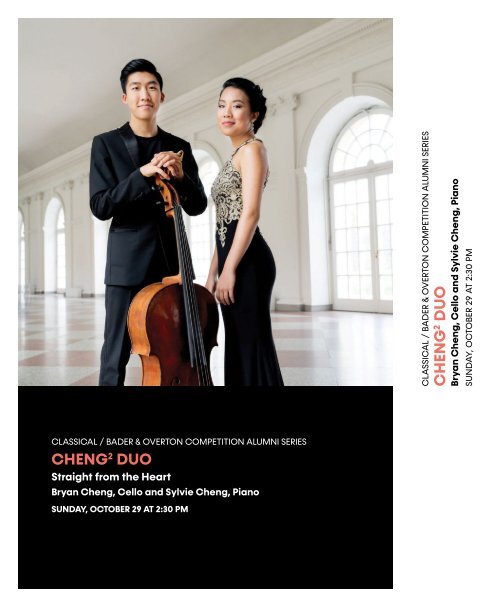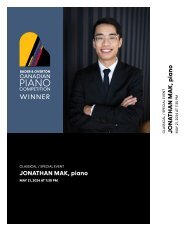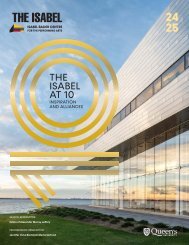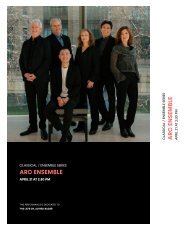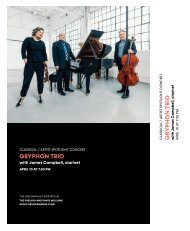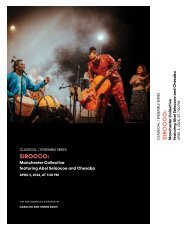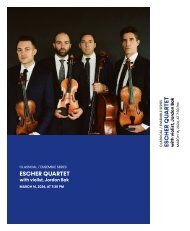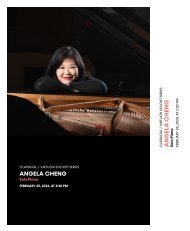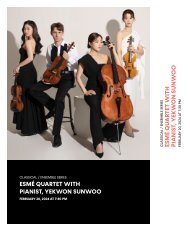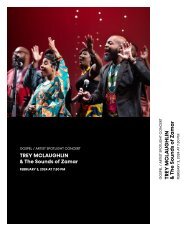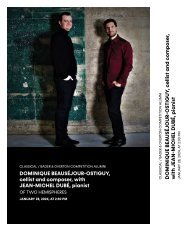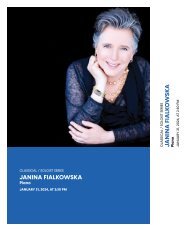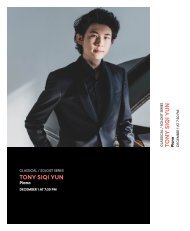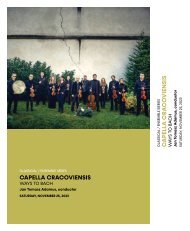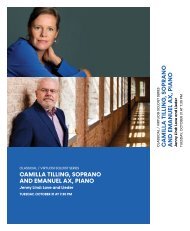You also want an ePaper? Increase the reach of your titles
YUMPU automatically turns print PDFs into web optimized ePapers that Google loves.
CLASSICAL / BADER & OVERTON COMPETITION ALUMNI SERIES<br />
CHENG 2 DUO<br />
Bryan Cheng, Cello and Sylvie Cheng, Piano<br />
SUNDAY, OCTOBER <strong>29</strong> AT 2:30 PM<br />
CLASSICAL / BADER & OVERTON COMPETITION ALUMNI SERIES<br />
CHENG 2 DUO<br />
Straight from the Heart<br />
Bryan Cheng, Cello and Sylvie Cheng, Piano<br />
SUNDAY, OCTOBER <strong>29</strong> AT 2:30 PM
CLASSICAL / BADER & OVERTON<br />
COMPETITION ALUMNI SERIES<br />
CHENG 2 DUO<br />
Straight from the Heart<br />
Bryan Cheng, Cello and<br />
Sylvie Cheng, Piano<br />
PROGRAM<br />
TSINTSADZE<br />
Five Pieces on Folk Themes<br />
No. 1 Villain’s Song on a Carriage<br />
No. 2 Tchonguri [Traditional Georgian 4-string lute]<br />
No. 3 Sachidao [Georgian Fighting Folk Dance]<br />
No. 4 Nana<br />
No. 5 Dance Tune<br />
WIANCKO<br />
Sonata No. 1 for Cello and Piano, Shifting Baselines<br />
Part I: Steady stroll—Flowing<br />
Part II: Free—Angular—Calm—Driving<br />
Part III: Glacial—Moto—Unwavering, but not too fast—Steady stroll<br />
INTERMISSION<br />
SIBELIUS Andante molto in f minor, JS 36<br />
RACHMANINOFF Sonata for Cello and Piano in g minor, op. 19<br />
Lento – Allegro moderate<br />
Allegro scherzando<br />
Andante<br />
Allegro mosso
PROGRAM NOTES<br />
Except for his cello and composition studies at<br />
Moscow’s Tchaikovsky Conservatory, Sulkhan<br />
Tsintsadze (1925-1991) lived in the Sovietcontrolled<br />
country of Georgia. He is considered<br />
one of Georgia’s most original and prolific<br />
composers of the 20th century, and, like many<br />
of his colleagues, often had to work under the<br />
USSR’s artistic constraints of simplicity, easy<br />
accessibility and the incorporation folk music and<br />
culture into his music. However, the Five Pieces<br />
on Folk Themes rise well above any feeling of<br />
compromise, as can be heard in the vibrancy of<br />
the second movement’s imitation of a traditional<br />
Georgian 4-string lute for solo cello alone, the<br />
middle movement’s depiction of wrestling<br />
combatants, and the energetically humorous<br />
dance finale.<br />
American composer and cellist, Paul Wiancko<br />
(b. 1983) recently joined the highly acclaimed<br />
Kronos Quartet. As one of the most respected<br />
and cutting-edge new music ensembles on the<br />
concert stage, this appointment is an impressive<br />
achievement. Like Tsintsadze, Wiancko certainly<br />
uses his knowledge and experience of playing the<br />
cello to create a highly distinctive and individual<br />
composition in his First Cello Sonata. Wiancko’s<br />
own comments on this work describe how it was<br />
influenced by Beethoven’s C-Major Cello Sonata,<br />
particularly in the way that Beethoven utilizes<br />
the cello’s natural resonance and displays a fairly<br />
no-frills-approach to harmony and rhythm. This<br />
directness can be heard in Wiancko’s sonata in<br />
the way that each of the work’s ten sections are<br />
primarily focused on a new textural colour. The<br />
best example of this singular process can be<br />
heard in the cello’s passage of gradually rising<br />
C-Major scales that slide upwards through the<br />
piano’s block chords. The “Shifting Baselines”<br />
subtitle is most noticeable in the work’s outer<br />
sections where the left hand of the pianist exactly<br />
doubles the cello’s pizzicato bassline.<br />
Jean Sibelius (1865-1957), undoubtedly Finland’s<br />
most famous composer, grew up playing the<br />
violin in a family piano trio. Although his younger<br />
brother would become a medical doctor, he was<br />
clearly a proficient cellist, as many of Jean’s cello<br />
compositions, including this Andante molto<br />
in F minor, were written for him. This short<br />
piece features a cadenza-like middle section<br />
for the cello that provides a brief contrast to<br />
the outer sections.<br />
With <strong>2023</strong> marking the 150th anniversary of<br />
the birth of Serge Rachmaninoff (1873-1943),<br />
his Second Piano Concerto, Op. 18, seems to be<br />
programmed with even more frequency than<br />
usual. It is worth mentioning this very popular<br />
piano concerto because the Cello Sonata on<br />
today’s program was written at approximately<br />
the same time and shares the same passionate<br />
chromatic language and a focus on supercharged<br />
and romantically inflected, melodic<br />
writing. Rachmaninoff composed the Cello<br />
Sonata to perform himself, alongside the greatly<br />
admired Russian cellist, Anatoly Brandukov, to<br />
whom the work is dedicated. In addition to the<br />
already mentioned expressive melodic writing,<br />
when hearing this sonata performed live it is<br />
often the unbelievably dense piano writing that<br />
leaves one awestruck. This pianism is so brilliant,<br />
it is easy to get swept away in the cascading<br />
piano figuration through which the cello must<br />
project with the highest level of impassioned<br />
intensity possible.<br />
©<strong>2023</strong> by John Burge for the Isabel<br />
ABOUT CHENG 2 DUO<br />
Rooted by a sibling bond that transcends the<br />
familial, the Cheng 2 <strong>Duo</strong> (pronounced Cheng<br />
Squared <strong>Duo</strong>) transfixes listeners through<br />
its impassioned expressivity and contagious<br />
joy—critics have hailed their performances<br />
as “brilliant” (The Sunday Times, UK), “truly<br />
exhilarating” (The WholeNote, Canada), and<br />
“absolutely captivating…through a tremendous<br />
mastery of their instruments” (Pizzicato<br />
Magazine, Luxembourg).<br />
Cellist Bryan Cheng, prizewinner of the 2022<br />
Queen Elisabeth Competition and Verbier<br />
Festival’s coveted Prix Yves Paternot, and<br />
pianist Silvie Cheng, 2022-23 Cecilia Concerts
Musician-in-Residence and National Arts Club<br />
Artist Fellow, have been making music together<br />
for nearly their entire lives. Since officially forming<br />
the Cheng 2 <strong>Duo</strong> at their 2011 Carnegie Weill<br />
Recital Hall debut, their artistry has left lasting<br />
impressions across the globe, with extensive<br />
tours to illustrious concert halls and international<br />
festivals throughout North America, Europe,<br />
Asia and South Africa.<br />
Recent highlights include recitals at the<br />
Frauenkirche Dresden, Flagey (Brussels),<br />
Munich Künstlerhaus, California Center for<br />
the Arts, Dame Myra Hess Series (Chicago),<br />
Chamber Music at the Clark (Los Angeles),<br />
Harvard University (Cambridge), Isabel Bader<br />
Centre for the Performing Arts (Kingston),<br />
Orford Musique, Salle Bourgie (Montréal), Palais<br />
Montcalm (Québec), as well as Chamberfest<br />
Cheboygan, Ottawa Chamberfest, and Toronto<br />
Summer Music Festivals. Past performances<br />
and interviews have been broadcast on CBC<br />
Radio, ICI Musique, Radio-Canada International,<br />
Vermont Public Radio, WCRB Classical Music<br />
Boston, WCNY Classic FM, Kulturradio RBB and<br />
Südwestrundfunk (SWR2) Germany, ORF Austria,<br />
and Classical Radio Orpheus (Moscow).<br />
In the vanguard of creative programming, Bryan<br />
and Silvie are equally committed to presenting<br />
traditional masterworks, rediscovering neglected<br />
repertoire, and championing the music of their<br />
time. Since 2013, they have commissioned<br />
and arranged 15 new works, as well as curated<br />
cross-disciplinary concert experiences that<br />
meld classical and contemporary music with<br />
jazz, poetry, and visual/media arts. Worldclass<br />
collaborative partners have included<br />
photographer and cinematographer Edward<br />
Burtynsky, Mercury Films, and multimedia<br />
studio Normal.<br />
Cheng 2 <strong>Duo</strong> has previously released a trilogy of<br />
critically-acclaimed albums on the German label<br />
audite: Russian Legends (2019), Violonchelo del<br />
fuego (2018), and Violoncelle français (2016).<br />
Born in Ottawa and Tokyo to Chinese parents,<br />
Bryan and Silvie are proud Canadians who are<br />
currently based in Berlin and New York City.<br />
For more information, follow @Cheng2<strong>Duo</strong><br />
on social media. ●<br />
Capella<br />
Cracoviensis<br />
CLASSICAL / ENSEMBLE SERIES<br />
Saturday, Nov 25, <strong>2023</strong>, 7:30 pm<br />
Based in Krakow, Poland, Capella Cracoviensis<br />
chamber choir and orchestra is one of<br />
the most exciting ensembles on the<br />
contemporary scene of period music.<br />
They will make their Isabel debut with<br />
a special program of Bach.<br />
Tony Siqi<br />
Yun, piano<br />
CLASSICAL / SOLOIST SERIES<br />
Friday, Dec 1, <strong>2023</strong>, 7:30 pm<br />
Combining poetry and elegance, charismatic<br />
young pianist Tony Siqi Yun is known as<br />
“a true poet of the keyboard” (Pianist<br />
Magazine). He will perform an intriguing<br />
showcase of Bach, Liszt, Beethoven, Berio,<br />
and Brahms’ powerful third Sonata.<br />
TICKETS: queensu.ca/theisabel · 613-533-2424 / General Public $45+ / Faculty/Staff $41+ / Students $10+


